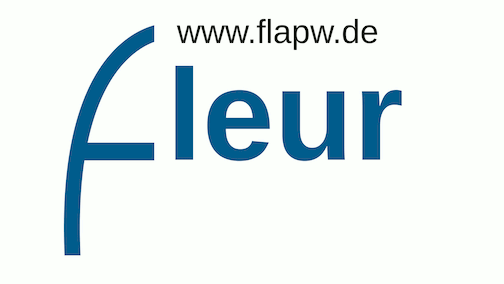1. Spin spirals
1.1 Spin-spiral ground state in fcc Fe
In its ground-state Fe crystallizes in a bcc structure, but it is also possible to synthesizes Fe in an fcc structure, e.g., fcc Fe clusters may form by fast annealing of Fe in a Cu matrix.
It is known that the magnetic ground state of such an fcc Fe structure is a spin spiral. In this exercise we will determine this magnetic structure by minimizing the total energy with respect to the $\vec{q}$-vector (wavevector) of the spin spiral.
Set up an fcc Fe input with the Cu lattice constant of $6.82~a_0$ and add the following line to the end of the inpgen input:
&qss 0.5 0.5 0.0 /
With this inpgen will generate a Fleur input file with the correct symmetries for the
provided $\vec{q}$-vector qss. Generate a Fleur input file with the
inpgen option -noco to also write out the parametrization for noncollinear calculations.
The provided $\vec{q}$-vector will rotate the magnetic moment in the MT sphere with respect to the atom position around the
z axis. Since by default the magnetic moment points in the z direction this will not have any effect.
To actually observe an effect we now tilt the magnetic moment into the xy-plane. This is done by
changing the $\beta$ angle in the nocoParams tag of the Fe atom to $\pi/2.0$.
With such a setup we have defined a spin spiral in the xy-plane. The rotation of the magnetic moment for an atom at $\vec{\tau} = (\tau_x,\tau_y,\tau_z)$ (in internal coordinates) is $2\pi\langle \vec{q} \vert \vec{\tau} \rangle$. The chosen $\vec{q}$-vector thus rotates the magnetic moment from unit cell to unit cell by $\pi$. We therefore describe an antiferromagnetic fcc Fe crystal with this setup.
We observe that the $\vec{q}$-vector in calculationSetup/nocoParams/qss was not taken over from the inpgen
input (due to a bug). We change it such that the first two coordinates are set to
0.5 and the last one stays 0.0. We want to perform several calculations with different $\vec{q}$-vectors.
We also observe that by default the switches calculationSetup/magnetism/@l_noco
and calculationSetup/nocoParams/@l_ss are set to true. This is because of the definition of a $\vec{q}$-vector
in the inpgen input. This means that we already activated noncollinear calculations with a rotation of the orientation of the
magnetic moment in the Fe MT sphere from unit cell to unit cell.
For the following calculation series we will adapt a few parameters to reduce the runtime and obtain a slightly better
convergence behavior. Set calculationSetup/scfLoop/@itmax to 90, calculationSetup/scfLoop@minDistance to
0.0005, calculationSetup/scfLoop/@maxIterBroyd to 15, and
use
<kPointMesh nx="7" ny="7" nz="7" gamma="F"/>
for the definition of the $\vec{k}$-point set. Please also execute
export OMP_NUM_THREADS=4
on your computer to enable the usage of 4 OpenMP threads.
Note: Some calculations will feature an incompletely convergence with respect to the charge density. But the total energies should be stable.
Perform the calculations for x-, y-coordinates (qXYCoord) of the $\vec{q}$-vector ranging from $0.0~a_0^{-1}$ to $0.5~a_0^{-1}$ in steps of $0.05~a_0^{-1}$ and generate a data file with two columns: qXYCoord vs. total energy. Plot the file. Which $\vec{q}$-vector minimizes the total energy?
